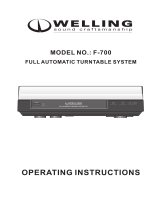
4
P-110 (En)
Please read all of the safety and operating instructions before operating
this appliance. Adhere to all warnings on the appliance and in the instruction
manual. Follow all the safety and operating instructions. These safety
and operating instructions should be retained for future reference.
1. Power sources -The appliance should be connected to a power sup-
ply only of the type described in the instruction manual or as marked
on the appliance. If you are not sure of the type of power supply to
your home, consult your appliance dealer or local power company.
For appliances intended to operate from battery power, or other
sources, refer to the instruction manual.
2. Power-cord protection - Power-supply cords (AC adaptor) should be
routed so that they are not likely to be walked on or pinched by items
placed upon or against them, pay particular attention to cords at plugs,
wall outlets, and the point where they exit from the appliance.
3. CAUTION - Polarization - This appliance may be equipped with a
polarized alternating-current line plug (a plug having one blade wider
than the other). This plug will fit into the power outlet only one way.
This is a safety future. If you are unable to insert the plug fully into the
outlet, try reversing the plug. If the plug should still fail to fit, contact
your electrician to replace your obsolete outlet. Do not defeat the safety
purpose of the polarized plug.
4. Ventilation - Slots and openings in the cabinet are provided for ven-
tilation and to ensure reliable operation of the appliance and to protect
it from overheating, and these openings must not be blocked or cov-
ered. The appliance should be situated so that its location or position
does not interfere with its proper ventilation. To maintain good venti-
lation, do not put records or a table-cloth on the appliance. Place the
appliance at least 10 cm away from the walls. Do not use the appli-
ance on a bed, sofa, rug or similar surface that may block the ventila-
tion openings. This appliance should not be placed in a built-in
installation such as a bookcase or rack unless proper ventilation is
provided or the manufacturer's instructions have been adhered to.
5. Water and moisture - The appliance should not be used near water
- for example, near a bathtub, washbowl, kitchen sink, laundry tub, in
a wet basement, or near a swimming pool, etc.
6. Temperature - The appliance may not function properly if used at
extremely low, or freezing temperatures. The ideal ambient tempera-
ture is above +5Åé (41ÜV).
7. Heat -The appliance should be situated away from heat sources such
as radiators, heat registers, stoves, or other appliances (including
amplifiers) that produce heat.
8. Electric shock - Care should be taken so that objects do not fall and
liquid is not spilled into the enclosure through openings. If a metal
object, such as a hair pin or a needle, comes into contact with the
inside of this appliance, a dangerous electric shock may result. For
families with children, never permit children to put anything, espe-
cially metal, inside this appliance.
9. Enclosure removal - Never remove the enclosure. If the internal
parts are touched accidentally, a serious electric shock might occur.
10. Magnetic fields - Keep the appliance away from sources of magnetic
fields such as TV sets, speaker systems, radios, motorized toys or
magnetized objects.
11. Cleaning - Unplug this appliance from the wall outlet before cleaning.
Do not use volatile solvents such as alcohol, paint thinner, gasoline,
or benzine, etc. to clean the cabinet. Use a clean dry cloth.
12. Accessories - Do not place this appliance on an unstable cart, stand,
tripod, bracket, or table. The appliance may fall, causing serious in-
jury to a child or an adult, and serious damage to the appliance. Use
only with a cart, stand, tripod, bracket, or table recommended by the
manufacturer, or sold with the appliance. Any mounting of the appliance
should follow the manufacturer's instructions, and should use a mount-
ing accessory recommended by the manufacturer. An appliance and
cart combination should be moved with care. Quick stops, excessive
force, and uneven surfaces may cause the appliance and cart combi-
nation to overturn.
IMPORTANT SAFEGUARDS
Never pull or stretch
the cord.
Caution : Read this page carefully to ensure safe operation.








